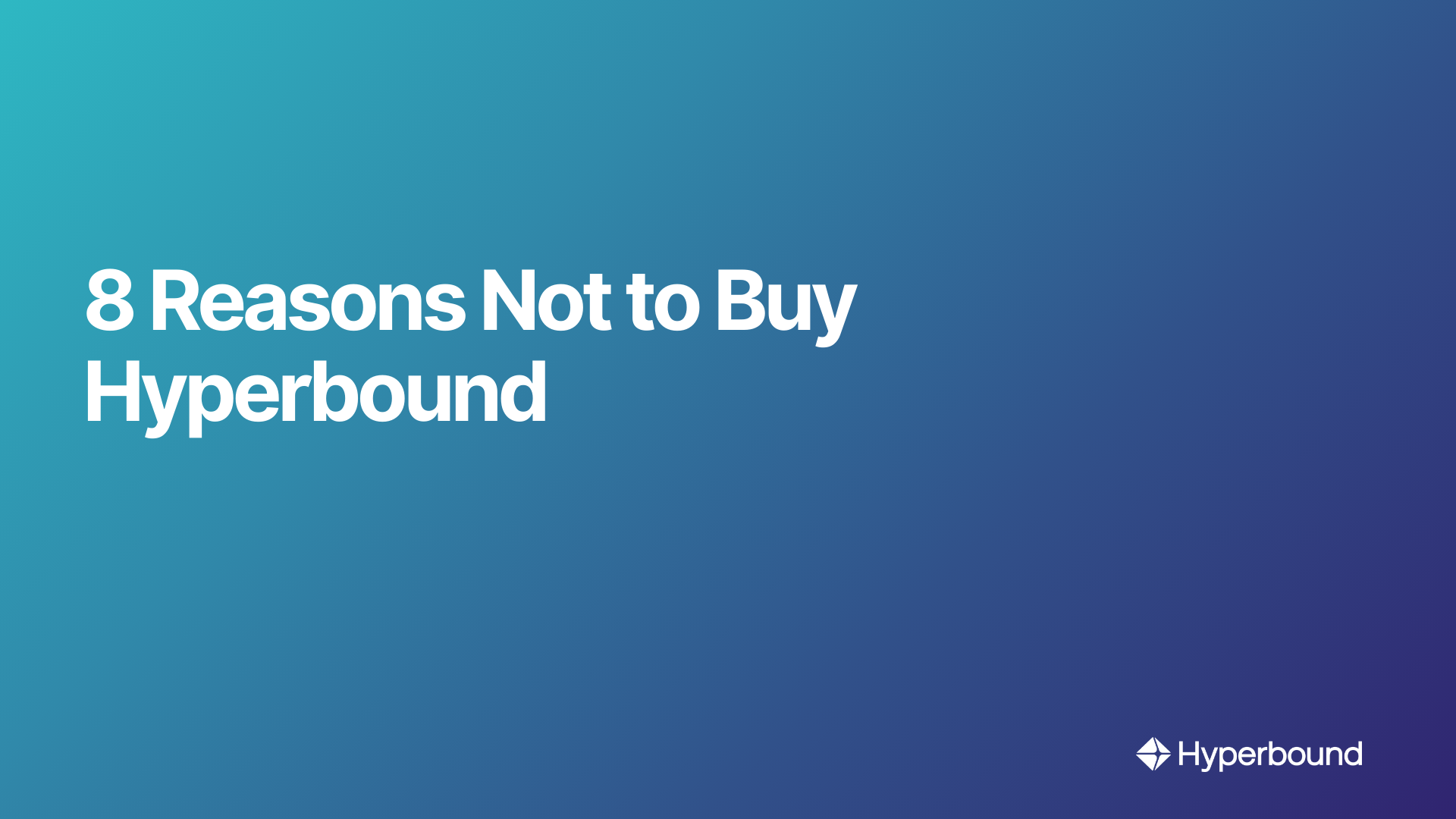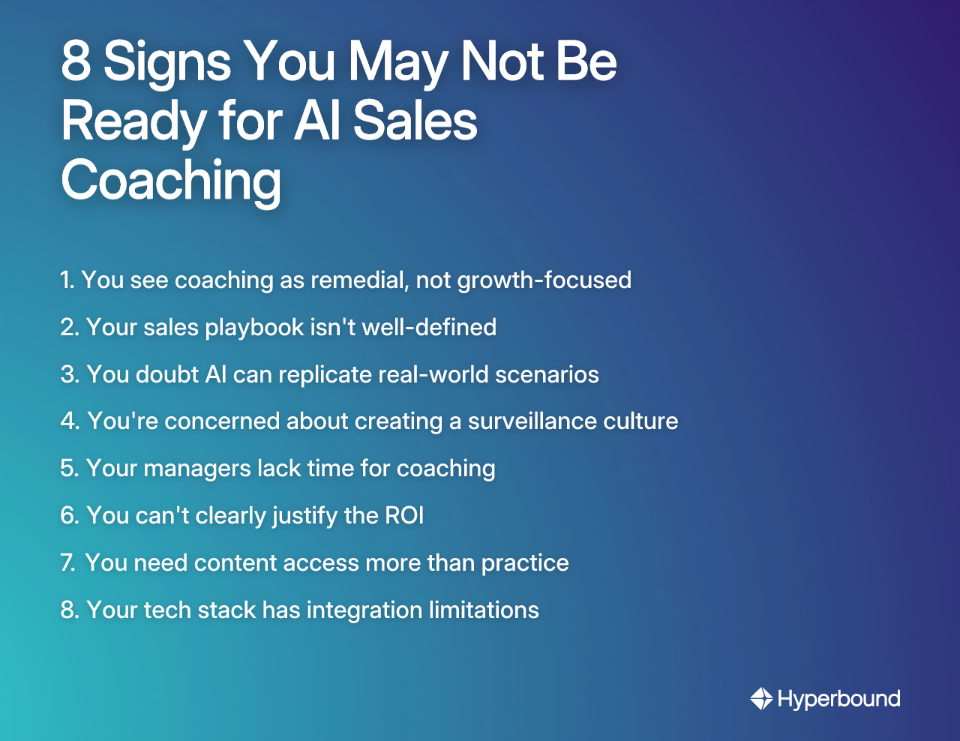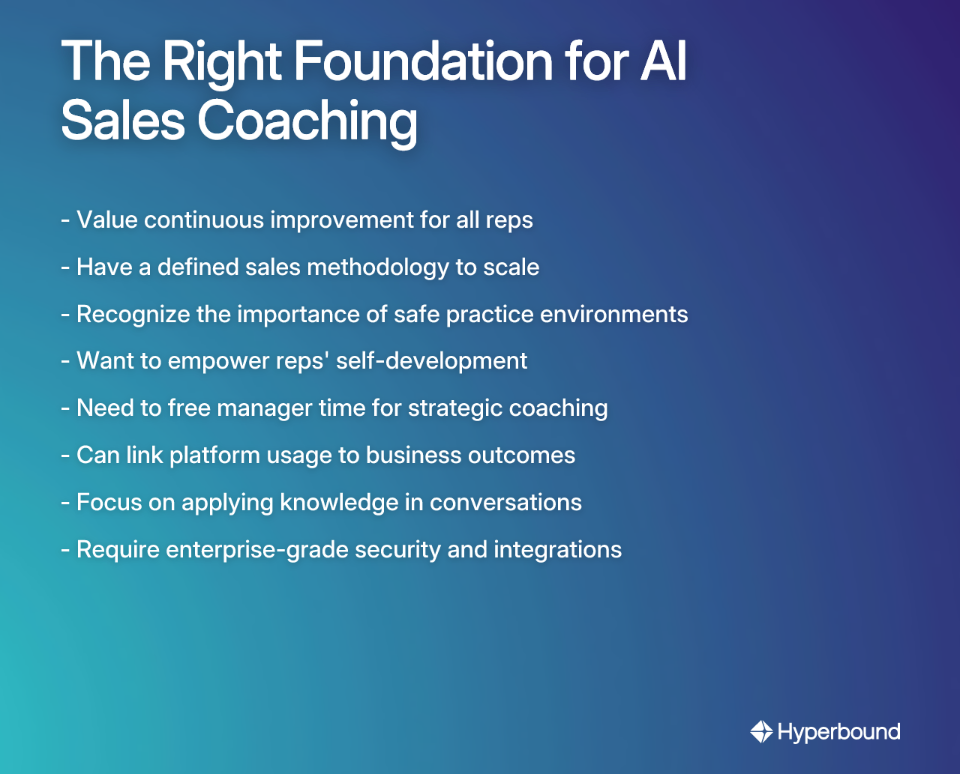
In the world of sales tech, it seems like every week there's a new AI tool promising to transform your team into quota-crushing superstars overnight. The hype cycle is relentless, and as one sales leader recently asked on Reddit, "Is anyone actually using AI for sales coaching, or is it all just snake oil?"
It's a fair question. With budgets tightening and skepticism around AI growing, you need to be absolutely certain that any new platform you bring into your tech stack will deliver real value—not just empty promises.
As the team behind Hyperbound, an AI-powered sales coaching platform, we're in a unique position. We could tell you that our solution is perfect for everyone, that it will solve all your problems, and that you'd be crazy not to buy it immediately.
But that would be dishonest. The truth is, Hyperbound isn't right for every sales organization—at least not yet.
So instead of giving you the standard sales pitch, let's take a different approach. Here are eight legitimate reasons you might want to hold off on investing in Hyperbound or any AI sales coaching platform. Because an AI tool isn't a magic wand; it's an amplifier. And if you're not ready, it might amplify the wrong things.

1. You Believe Coaching is Only for Underperformers
Many organizations view sales coaching as remedial—something reserved for struggling reps or new hires who haven't figured things out yet. If this describes your company's coaching philosophy, you might want to reconsider investing in a comprehensive AI coaching platform.
Why? Because if coaching isn't seen as a tool for continuous growth for everyone on the team, a platform like Hyperbound will face low adoption from your core and top performers. This dooms its ROI from the start. According to research from Integrity Solutions, 50% of organizations struggle to even identify who needs coaching, often defaulting to a performance management approach that creates a fear-based environment.
However, if your organization understands that even top performers benefit from ongoing skill development, an AI coaching platform becomes much more valuable. The best sales organizations know that coaching is vital for retaining high achievers and helping them master new skills. In this environment, Hyperbound can provide tenured AEs with opportunities to practice new competitive talk tracks and help CSMs prepare for difficult renewal conversations—creating a culture where everyone has a tool for self-improvement.
2. You Don't Have a Defined Sales Playbook
One of the most common challenges in sales training is that it "often serves us one size fits all," according to RAIN Group. If your organization doesn't have a clear, documented sales methodology, what exactly will an AI coach... coach to?
Without proper guidance, reps risk reinforcing bad habits by "gaming" the AI system instead of learning effective techniques. Reply.io warns that this is a real risk with AI coaching tools. An AI coaching platform is only as good as the methodology it's based on. Without a defined playbook, the feedback will be generic and ineffective. You'll be investing in a powerful engine with no steering wheel.
On the other hand, if you've invested in building a sales methodology (with specific discovery questions, objection handling frameworks, value statements), you need a way to scale it consistently across your team. This is where AI coaching platforms shine—they can operationalize your playbook, providing feedback aligned with your specific talk tracks and frameworks rather than generic sales advice.
3. You're Worried AI Can't Replicate Real-World Chaos
Sales conversations are messy. Prospects interrupt, throw curveballs, and react with unexpected emotions. Many sales leaders are rightfully concerned that AI simulations can feel sterile and unrealistic.
According to Reply.io, AI role-plays often fall short of "mimicking the vast emotional volatility and complex objections encountered in real sales scenarios" and can't replicate the "emotional stakes of real selling." If the AI personas are too generic or predictable, practice becomes a shallow, unhelpful exercise that doesn't prepare reps for real-world conversations.
This is a valid concern—no simulation is a perfect substitute for reality. But the alternative is practicing on live prospects and risking actual deals. The goal of AI role-play isn't to perfectly replicate human unpredictability, but to build muscle memory in a safe, repeatable environment where reps can fail without consequences.
4. You Fear It Will Create a "Big Brother" Culture
The idea of AI monitoring every call can trigger fears of micromanagement and surveillance. Reps worry about job insecurity due to AI performance tracking, as seen in recent Reddit discussions, leading to performance anxiety that can damage morale and create a culture of fear rather than improvement.
If your team's culture is already low-trust or your managers tend to micromanage, introducing an AI monitoring tool can be disastrous. The tool will be seen as a weapon for punishment, not a shield for practice.
The best implementations position technology as a tool for empowerment and self-development, not as a way to catch reps doing something wrong. A rep-first approach to coaching provides private, safe-to-fail environments where salespeople can practice and get instant feedback without manager oversight, allowing them to own their development rather than feel constantly scrutinized.
5. Your Managers Don't Have Time to Coach
Managers are often buried in forecasting, reporting, and putting out fires. "Making time for coaching" is one of the biggest challenges they face, according to Integrity Solutions. The "time commitment" is immense when they're also pressured to generate new business.
If a tool adds more administrative work to a manager's already overflowing plate, it will be abandoned quickly. The goal is to enable coaching, not create more obstacles to it.
For AI coaching platforms to be successful, they should give managers time back, not take it away. The most effective solutions automate the most time-consuming parts of coaching, like call reviews, by providing AI-generated summaries, highlighting key moments, and delivering objective scores against your playbook. This frees managers from being tactical call reviewers and empowers them to be strategic coaches, using data-driven insights to have more impactful one-on-ones.

6. You're Not Ready to Justify the Cost & ROI
AI tools can be expensive, and leadership is often skeptical about the return on investment. Training is frequently "seen as an expenditure," not an investment, and establishing a "causal link between sales training... and business results" is a major hurdle, as RAIN Group points out.
The high cost of market-leading tools makes many teams hesitant, as seen in recent Reddit discussions where sales professionals express frustration with high price points.
If you can't define what success looks like and how you'll measure it, you won't be able to prove the value of your investment. You need to connect platform usage to key business metrics like reduced ramp time, higher conversion rates, increased quota attainment, and improved message consistency.
Without a clear ROI framework, even the best AI coaching platform will struggle to demonstrate its value to skeptical executives who see it as just another expense.
7. You Need a "Just-in-Time" Content Library, Not a Practice Platform
Sometimes, the primary need isn't practice but access to information. Your reps might need sales collateral, battle cards, or answers to questions in the moment of a call or while in their CRM. A platform focused solely on pre-call practice or post-call review might not solve your most pressing enablement problem.
As Spekit notes, some teams need "just-in-time" enablement—tools that deliver the right information at the right moment, not practice environments. If your biggest pain is content organization and in-workflow access to information, a dedicated content management system might be a better fit than an AI coaching platform.
However, if your problem isn't access to information but the application of that information in live conversations, then practice is paramount. Knowing the playbook is different from executing it under pressure. The right AI coaching platform serves as the "batting cage" where reps internalize the content from your enablement library and learn to deliver it effectively, bridging the gap between knowing what to say and knowing how to say it.
8. Your Tech Stack is Locked Down and You're Worried About Security
A new tool that doesn't integrate with your existing sales tech stack (CRM, call recorder) is dead on arrival. Furthermore, with call recordings and sensitive customer data involved, data privacy and security are non-negotiable concerns.
As Spekit highlights, integration capabilities are a critical factor when evaluating sales coaching software. A tool that creates data silos or poses a security risk is a liability, not an asset. These are foundational requirements for any enterprise-grade software.
You should only consider platforms that are built with enterprise needs in mind from day one—those that integrate seamlessly with your existing tools and meet rigorous security standards like SOC 2 Type II compliance to protect both your data and your customers' information.
When Hyperbound Is Right for Your Team
If you've made it this far, you might be wondering: "So when should I consider Hyperbound or a similar AI coaching platform?"
The answer is straightforward: When you have the right foundations in place.
Hyperbound is designed for sales organizations that:
- Value continuous improvement for all reps, not just underperformers
- Have a defined sales methodology they want to scale consistently
- Recognize that practice in safe environments leads to better performance in real-world scenarios
- Want to empower reps to own their development, not create a culture of surveillance
- Need to free up manager time for strategic coaching, not tactical call reviews
- Can connect platform usage to measurable business outcomes
- Need help applying knowledge in live conversations, not just accessing information
- Require enterprise-grade security and integrations with their existing tech stack

For these organizations, Hyperbound's AI-powered roleplays, call scoring, and coaching tools can drive significant improvements in rep performance, manager effectiveness, and overall sales outcomes.
Conclusion
An AI sales coaching platform is not a silver bullet. It's a powerful amplifier for organizations with the right foundations: a commitment to a coaching culture, a defined sales process, and clear goals.
If your culture isn't ready, your process is undefined, or your goals are unclear, you should address those foundational issues first. No technology, no matter how advanced, can fix those underlying problems.
But if you've read these reasons and see them not as roadblocks but as challenges you're ready to solve, then you might be the right fit for an AI coaching platform like Hyperbound. If you're ready to scale your playbook, empower your managers, and give your reps a tool to master their craft, then it might be time to take the next step.
Because ultimately, the goal isn't to buy software—it's to build a sales organization that consistently delivers exceptional results through skilled, confident, well-coached representatives. And sometimes, the right technology can help you get there faster.
Frequently Asked Questions
What is AI sales coaching?
AI sales coaching uses artificial intelligence to analyze sales activities, simulate role-play scenarios, and provide reps with data-driven feedback. It helps scale personalized coaching by automating tasks like call reviews and offering a safe environment for reps to practice and refine their skills.
How does AI coaching improve sales performance?
AI coaching improves performance by providing consistent, objective feedback aligned with your company's sales playbook. It allows reps to practice handling objections, pitching value propositions, and navigating difficult conversations in a repeatable, risk-free environment, which builds the muscle memory and confidence needed for real-world success.
Will AI replace human sales managers?
No, the goal of AI coaching is not to replace sales managers but to augment their capabilities. It acts as a co-pilot, handling the time-consuming work of call analysis and initial feedback. This frees up managers to focus on high-impact strategic coaching, mentorship, and deal strategy where their human expertise is most valuable.
How can I ensure my sales team adopts an AI coaching tool?
Successful adoption hinges on positioning the tool as a benefit for the reps, not a surveillance device. Frame it as a private, safe-to-fail practice environment where they can build skills and confidence. Integrating the platform into your existing coaching rhythms and showing a clear line between practice and improved performance (and commissions) will also drive buy-in.
What is the most important prerequisite for implementing AI sales coaching?
A well-defined sales playbook is the most critical prerequisite. An AI coach needs a clear, documented methodology to coach against—including specific talk tracks, discovery questions, and objection-handling frameworks. Without this foundation, the AI's feedback will be generic and ineffective.
How do you measure the ROI of AI sales coaching?
You can measure the ROI of AI sales coaching by tracking improvements in core business metrics. Key performance indicators to monitor include shorter ramp times for new hires, higher conversion rates between sales stages, increased quota attainment, and better message consistency across the team.
Can AI sales coaching really simulate complex, real-world sales scenarios?
Yes, modern AI coaching platforms can simulate a wide variety of realistic and complex sales scenarios. While no simulation is a perfect replica of human interaction, advanced AI can be programmed with different buyer personas, industry-specific jargon, and unexpected objections. This provides a highly effective training ground for reps to prepare for the chaos of real-world conversations.

Book a demo with Hyperbound
.png)













